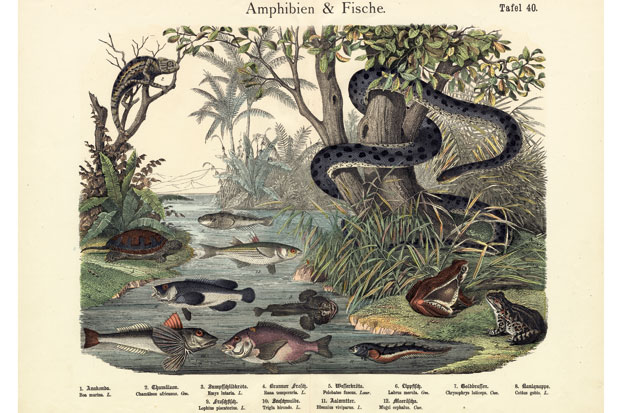‘The meaning of life’, announces Simon Barnes in the opening pages of his new book, ‘is life, and the purpose of life is to become an ancestor.’ Simple really. Yet it is hard to imagine a title launched this autumn that has a more all-encompassing theme or a larger moral purpose. Ten Million Aliens is an impassioned hymn to the teeming multitude of organisms crowded alongside humanity on this ever-smaller planet.
In truth even Barnes’s vast panorama is only a partial statement about the Earth’s genuine biodiversity. For, as he readily acknowledges, he has been obliged to omit for want of space all 28 kingdoms of bacterial organism, five other kingdoms of unicellular life, as well as all the hundreds of thousands of green plant and fungi species. To the remaining complement numbered in the book’s title he has devoted 131 chapters in 480 pages. In case you want the maths, it works out at more than 20,000 species per page which, at times, obliges this book to look and sound like an extended catalogue.
But then how on earth do you begin to narrate life’s full and fantastical story? Barnes has come up with some immensely elegant solutions. Rather than beginning with the most rudimentary types of animal and journeying in a linear narrative towards the most complex, he intertwines the two categories in alternating chapters. So he proceeds with an account of the most sophisticated and simple in tandem.
In this way the sex-loving bonobo chimpanzee, which has only one per cent genetic variance from Homo sapiens, shares much the same space as the 10,000 varieties of water-dwelling sponge, made of calcium carbonate and living on the seabed, sometimes five miles under. Here the mighty lion or the bone-breaking hyena lies down with the loa loa parasitic worm that burrows through the eyes of its human victims. In Barnes’s intricately involved structure the final chapters converge not at mammals, even less at primates, but at fish, a kind of midpoint in the standard taxonomy of zoologists.
It is an ingenious conceit, and with his entwined stories Barnes seeks to mimic the interlocking pattern of life’s fundamental building brick — the double coil of DNA. Yet through this same structure one of the book’s main contentions is constantly re-asserted. To the stock anthropocentric assumption that life ascends in importance until it arrives at the ultimate species — ourselves — Barnes answers emphatically ‘No’. This is just hubris. As he says, the meaning of life is life.
My guess is that he wants us to see more clearly that we are just one tiny part of life’s astonishing variety and that we should learn to play our role more constructively. As I say, this is an assumption, because one of the most striking aspects of Ten Million Aliens is its author’s steadfast refusal to grandstand in the name of environmentalism, of which we know he is a passionate advocate. Perhaps better to let us slowly absorb the momentous story of our fellow earthlings and then come to our own moral conclusions.
An intriguing subplot in the Barnes narrative is his perpetual reference to two other works that attempt to encompass the whole story of life’s journey, each in a very different way. They are Charles Darwin’s On the Origins of Species and James Joyce’s Ulysses. This interleaving reference to his two heroes, which allows Barnes to talk about his parallel passions for literature and natural science, restates the major intellectual effort that underpins this work. Yet the book that most closely compares to this one is surely that of the American entomologist, Edward O Wilson, the monumental and brilliantly compressed The Diversity of Life (1992).
Barnes has only a fraction of Wilson’s omniscient grasp of science, but this is to our benefit. The Diversity of Life is a much more orthodox work of ecology, and is steeped in the complex vocabulary of that discipline. Barnes, by contrast, is a journalist of genius. He knows how to make things accessible, simple and entertaining. Clarity is the cardinal virtue of Ten Million Aliens.
I can think of few nature writers who have worked harder to acquaint us with the unloved, the neglected and completely unknown. We discover, for instance, the importance of 20,000 flatworm species, which have neither a blood system nor organs for breathing, or the extraordinariness of the bootlace worm. It can grow to 177 feet in length! We are encouraged to ponder the miracle of animals called locifera that somehow survive in the absence of oxygen and light.
The author also has a wonderful fund of personal anecdotes that spice his accounts of all manner of African animals. A favourite describes one whisky-sodden night when his bedroom ceiling was studded with 47 spiders, not one of them smaller than three inches across.
Ironically, it is Barnes’s long record as a journalist that also gives rise to the book’s one significant flaw. Over the years he has acquired all the razor-edged angles enabling a writer to cut directly into a theme and fillet out its meanings in less than 1,000 words. Here they all are: puns (‘Axis of Weevil’), shock (‘Sod the Rainforest), repetition, oxymoron (‘Brother Sponge’), informality, slang (‘The American bison has long since been shot to buggery’), smut and horror (‘hyenas will fearlessly enter a tent and bite the face off a sleeping man’).
One is never more than a few lines from this large repertoire of stylistic tics and it creates the impression that the author is forever at our shoulder or in direct conversation with us. Just occasionally Barnes drops the self-conscious attentiveness and lets himself (and his reader) off the leash, such as in his beautiful description of spiders’ silk.
It used to catch the low morning sun in the autumn as I headed up to feed the horses. And when a bright morning coincided with a hefty dew … it seemed that every two blades of grass were linked by a golden thread a few inches long: a strand of precious metal that trembled slightly when the breeze shook. It seemed as if I was walking through not a pasture for horses but a crop of gold: a waiting gilded harvest … from the bosom of the earth.
The ultimate writer’s trick is not to make the reader constantly aware of an author’s presence. On the contrary, it is to let us assume that we discovered his world all by ourselves.
Got something to add? Join the discussion and comment below.
Get 10 issues for just $10
Subscribe to The Spectator Australia today for the next 10 magazine issues, plus full online access, for just $10.
Available from the Spectator Bookshop, £17 Tel: 08430 600033. Mark Cocker’s latest book is Claxton: Field Notes from a Small Planet.
You might disagree with half of it, but you’ll enjoy reading all of it. Try your first month for free, then just $2 a week for the remainder of your first year.














Comments
Don't miss out
Join the conversation with other Spectator Australia readers. Subscribe to leave a comment.
SUBSCRIBEAlready a subscriber? Log in